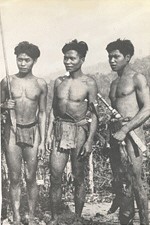Mlabri in Thailand

Photo Source:
Copyrighted © 2026
Peoples of Laos, Asia Harvest All rights reserved. Used with permission |
Send Joshua Project a map of this people group.
|
| People Name: | Mlabri |
| Country: | Thailand |
| 10/40 Window: | Yes |
| Population: | 400 |
| World Population: | 420 |
| Primary Language: | Mlabri |
| Primary Religion: | Ethnic Religions |
| Christian Adherents: | 21.00 % |
| Evangelicals: | 21.00 % |
| Scripture: | Translation Started |
| Ministry Resources: | No |
| Jesus Film: | No |
| Audio Recordings: | No |
| People Cluster: | Mon-Khmer |
| Affinity Bloc: | Southeast Asian Peoples |
| Progress Level: |
|
Introduction / History
Ironically, the smallest ethnic group in Laos happens to be one of the most interesting. Twenty-two Mlabri people, in four families, live in the Phiang District of Xaignabouri Province. Epidemics and a decrease of their resources has almost wiped them out. Approximately 300 Mlabri live across the border in Nan and Phrae provinces of Thailand.Mlabri or Mabri is the self-name of this group.
What Are Their Lives Like?
The Lao and Thai call them Kha Tong Luang, which means 'slaves of the Yellow Banana Leaves'. This name is given to them because of their custom of living in temporary ground-level shelters made of a wooden frame and covered with banana leaves. When the leaves wither and turn yellow, the Mlabri abandon their homes and move to a different area to hunt for food. This cycle usually repeats itself every 5-15 days.There is another group of about 300 people called Kha Tong Luang in Laos, who practice the same customs. They live in remote mountains on the Laos-Vietnam border. The Mlabri and this latter group are not linguistically related and are separated by a considerable distance. To complicate matters, the Pakatan in Laos is also labeled Kha Tong Luang by the Lao.Mlabri men wear little clothing, except a small loincloth.
What Are Their Beliefs?
They are animists who believe they are not entitled to cultivate the land for themselves. Their matrilineal social organization allows serial monogamy; a Mlabri woman typically changes mates every five or six years, taking any children from the previous union with her.After death, the corpse of a Mlabri is placed in the treetops to be devoured by carrion birds.The Mlabri religion is one of polytheism. They believe evil spirits inhabit trees and fear rainbows, which they believe are monsters that devour human flesh.
What Are Their Needs?
Mlabris need to learn to adapt to a rapidly changing world. This will be difficult in a rapidly advancing country like Thailand.
Prayer Points
Pray God would help the Mlabri break through the barriers that prevent them from following Christ.Pray for the Holy Spirit to give Mlabri family leaders a deep need for spiritual truth that will lead them to the cross.Ask God to bless and multiply the work of New Tribes Mission among the Mlabri in Thailand.